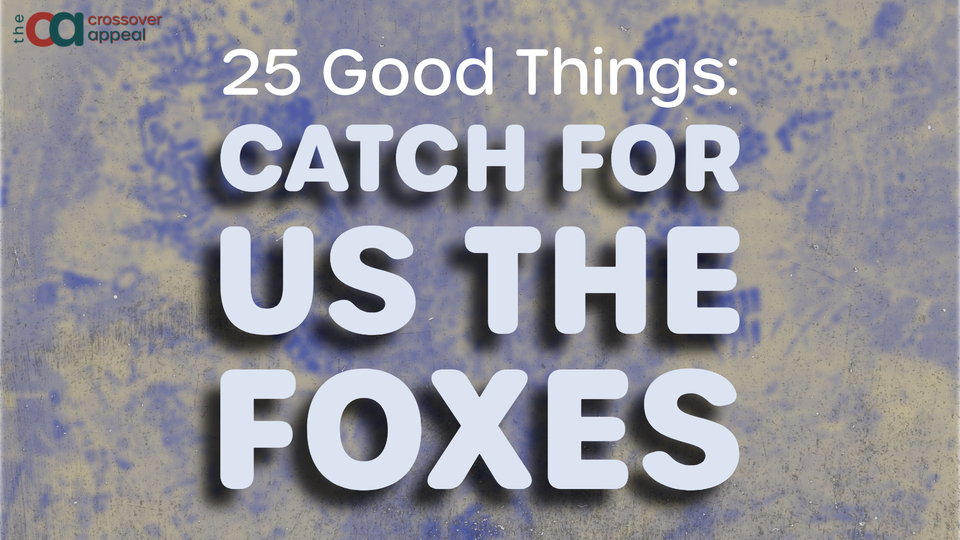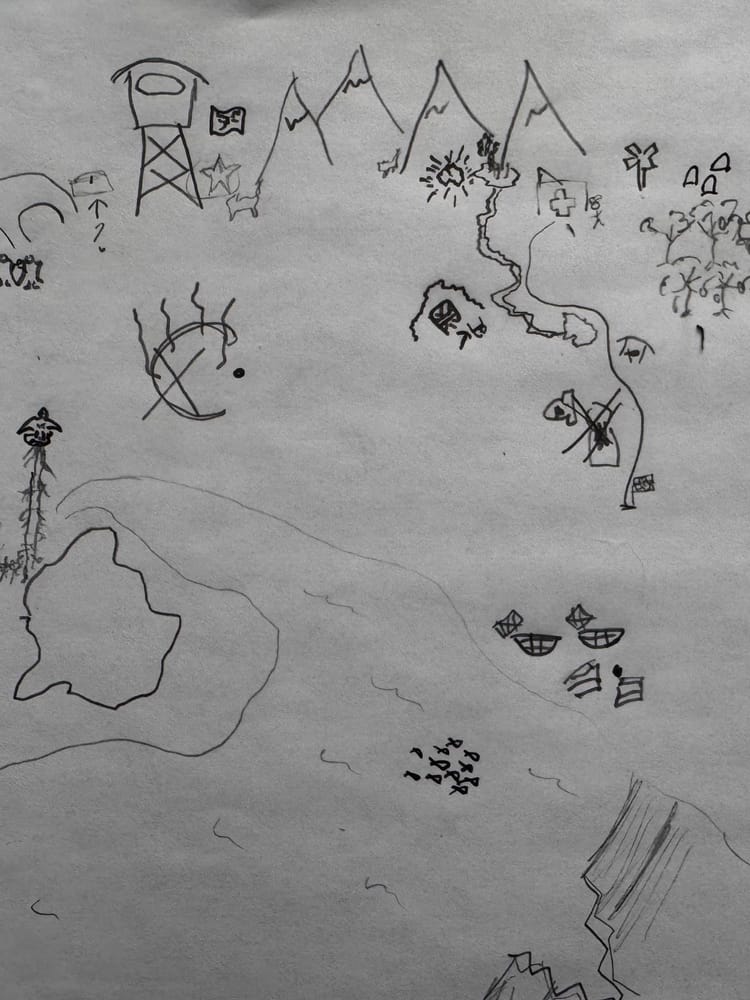mewithoutYou - Catch for Us the Foxes

Picture this.
It’s 2004. You’re fifteen years old, searching through the CD section in Walmart’s electronics department. You live way out in the sticks, at least a forty minute drive to any record store of note and you still don’t have your license. Meaning your only occasion to grab some new music is during the semi-regular family Walmart stop on the way home from Wednesday night church.
That’s me thumbing through the crystal cases. I’m staying strictly within the boundaries of their Christian rock section because that’s all I’m allowed to have at home. If you aren’t familiar with the late 90s / early 00s subcultural mirror-world found in the Christian music section, let me tell you, it was a strange place.
Christian music, especially Christian rock, tended to ape genres that resembled forms of cultural expression already aligned with established forms of Christian activity. Worship music that sounded like church. Nu-metal, whose meatheaded aggression matched the self-loathing introspection of confession. Pop rock that fit a million youth pastor quips into each three-and-a-half minute song. It was common back then to see posters in your church’s youth center that advertised Christian bands to listen to based on your secular preferences. Like Incubus? Try Kutless! Like Weezer? Try Switchfoot! That kind of thing.
It wasn’t, in other words, a wonderland of originality.
But if you were an Evangelical teenager in the early 2000s, desperate for new experiences and trying to connect with friends on message boards and Xanga blogs, the CD section was still your best bet for building some cultural currency while sneaking a little blessed angst into your bedroom boombox.
But that day I found a true shock to the system. Tucked between the Relient Ks and the Thousand Foot Krutches was a cryptic looking record bearing the name of a band I’d seen once on my fuzzed-out local access music video channel. It looked interesting, and the review I read made it sound like an aggressive, weird listen. I figured I was up for the challenge, so I plopped 13 bucks down and went home with Catch for Us the Foxes, the second studio album by Philadelphia band mewithoutYou.
Catch for Us the Foxes is, any way you cut it, a special album. It’s a weird little misfit in so many ways. It looks awkward on the shelf next to other standouts from mewithoutYou’s alternative Christian record label, Tooth & Nail, and it certainly wasn’t the type of thing that made it onto those youth group recommendation posters. It’s a mix of post-hardcore riffing, spoken, shouted, and sung vocals, atmospheric, DIYish production, and intensely personal lyricism that threw a diaristic cast across the whole thing. It was, and still is, bewitching.
It’s also a record about being a misfit. Or at least, about the impossibility of fitting and the toll such a thing takes on the soul. Theologically dense, Catch for Us the Foxes is a frantic letter to God, the world, the church, scrawled in shaky script, asking the emptiness if anyone’s there at all. Every song is a tense reckoning between virtue and perdition. Every line a deep plunge into the suffering of a good man straining under the heavy, awful weight of what everything he believed in was becoming. Every melody a protest, a plea, and a purge - washing out the sins this band could already feel their faith pressing them into.
If you’re still looking for a blanket, sweetie, I’m sorry, I’m no sort of fabric. But if you need a tailor, then take your torn shirt and stumble up my stairs and mumble your pitiful prayers and in your tangled night’s sleep, our midnight needles go to work until all comfort and fear flows in one river down on the shelf by the mirror where you see yourself whole, and it makes you shiver.
Listening to Catch for Us the Foxes gives you the sense of eavesdropping on someone’s mumbled, pitiful prayer, and in the bits and pieces you catch from the other pew, you begin to understand they're praying for you.
By 2010 I knew the faith that had shaped my childhood and adolescence was going to have to change dramatically if I was going to stick it out. Or at least, my relationship to it would need significant renovation. I spent the decade after graduating college looking for ways to stay inside Christianity despite my burgeoning consciousness that whatever value the faith tradition had for me was increasingly undermined by what it had become out in public. I turned to introspection, looking deep inside myself to find what I actually believed, what I even could believe, and what I needed to discard. I turned to community, looking for alternative ways of collecting around Christ, looking for proof of God - or at least evidence, I suppose - in the ill-fitting collections of people I “did church with”.
Sometimes all this searching felt rewarding, sometimes it felt exhausting, but by the end of it, when my wife and I shut the doors of our home to the pandemic raging outside in the spring of 2020, it mostly felt like I’d wasted my twenties trying to fit inside something that didn't want me at all.
See, while I was doing my searching, the religion that birthed the Christian rock scene I came up in, had metastasized into something ugly at the national scale. American politics has always, of course, been deeply connected to Christianity, for good or ill. But between 2010 and 2020, the energy that Evangelicals had carefully cultivated since Falwell’s moral majority, finally bore its sourest, truest fruit in the form of Donald Trump and his pure, contemptuous expression of power. The compassionate conservative had become the tea partier which in turn became MAGA, all under the white, red, and blue banner of the Christian flag I grew up praying beneath.
Oh Christ, when you’re ready to come back, I think I’m ready for you to come back. But if you want to stay wherever exactly it is you are, that’s okay too - it’s really none of my business.
So I found myself adrift, wondering if all of this really was none of my business at all, and worse, if it was my business, what I owed the world for having been part of it.
Catch for Us the Foxes always sounds wonderfully live, like you’ve projected yourself right in the middle of their studio. It’s production is a little messy, frayed at the edges, and prone to huge dynamic bursts as the drums push their way to the front, the vocals to the back, and then vice versa. These swings follow each song’s internal emotional logic, drawing you into the primal headspace of Aaron Weiss, mewithoutYou’s frontman. Because of these dynamics, I felt for a long time that Catch for Us the Foxes’ main defining feature was catharsis, but now, twenty-years later, I think it’s something closer to liturgy.
Philly has been a hotbed for alternative liturgy for a while. Over the last quarter century, it’s given birth to The Psalters (a folk punk band and a radical, anti-patriotic Christian community), Shane Claiborne (founder of the Simple Way and a key figure in the New Monastic Movement), and Circle of Hope (a failed experiment in reconfiguring Church, recently profiled in book-length form by Eliza Griswold). mewithoutYou was at various moments connected to all these projects, and in some ways, Catch for Us the Foxes is emblematic of all that energy, swirling around with nascent rebellion.
And yet, almost as though they already understood the failure embedded, like a ticking time bomb, within these alternative Christian projects, mewithoutYou’s second album stitches the optimism of new futures to the despair of seeing your best efforts betrayed, destroyed, and rejected. You can hear it in the way the guitars flux between burning distortion and mournful plucking. You can feel it in the split polarity of Weiss’ vocal performances, sage and quiet in one moment, fiery and prophetic in the next. If the definition of insanity is to try the same thing over and over again, knowing the outcome will be the same, Catch for Us the Foxes sees all of these underground energies buzzing around the detritus of the Evangelical movement and says “this isn’t working but it’s all we have.”
You, my hidden pearl of pure and perfect love, and I’m the living example of 100% the opposite of this. If I ask the same questions, well maybe I repeat myself from time to time. But it’s because everyone who answers me is a liar.
Catch for Us the Foxes is, to paraphrase Will Cather, a revolt against the homilies by which this world is run, a wilting carnation memorializing a dream of abundance and belonging.
I think a lot about what it means that the same scenes that produced Skillet, Hawk Nelson, and Newsboys also gave us mewithoutYou’s work. Even in the midst of a religious ideology as restrictive, repressive, and ordered as American Evangelicalism, there are always going to be offshoots that try to undo the ugliness that system unleashes. I also think a lot about how that same system produced me, my tastes, my prejudices, my passions. Maybe Catch for Us the Foxes means so much to me because it feels like someone else seeing the weird contorting effects that wandering the post-Evangelical desert has on you.
On a record chock full of vivid imagery, it’s the opener, “Torches Together” that pulls together the most shocking picture. The opening verse repeatedly asks, “Why burn poor and lonely?”, to which mewithoutYou responds by sharing in our condemnation together like communion.
We’ll be like torches, we’ll be like torches, with whatever respect our tattered dignity demands, torches together hand-in-hand.
The chorus swells with a massive wall of distortion as Weiss’ voice shreds through those lines, engulfed in the noise like the flames burning the doomed at the stake. It’s the sound of a desperately lonely person, seeing the isolation and misery of everyone around him, understanding that the ship we all share is going down, and reaching out to celebrate our destructions together. At least then there’s a testament, and maybe a sign that we actually built something after all. Else, why burn us in the first place?






Member discussion